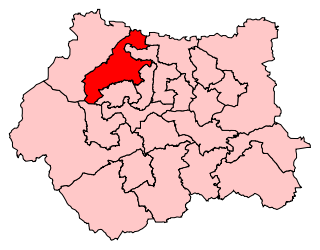
Shipley is a constituency represented in the House of Commons of the UK Parliament since 2005 by Philip Davies, a Conservative.

Richmond (Yorks) is a constituency in North Yorkshire represented in the House of Commons of the UK Parliament since May 2015 by Rishi Sunak, a Conservative.

The 1831 United Kingdom general election saw a landslide win by supporters of electoral reform, which was the major election issue. As a result, it was the last unreformed election, as the Parliament which resulted ensured the passage of the Reform Act 1832. Polling was held from 28 April to 1 June 1831. The Whigs won a majority of 136 over the Tories, which was as near to a landslide as the unreformed electoral system could deliver. As the Government obtained a dissolution of Parliament once the new electoral system had been enacted, the resulting Parliament was a short one and there was another election the following year. The election was the first since 1715 to see a victory by a party previously in minority.

The 1830 United Kingdom general election was triggered by the death of King George IV and produced the first parliament of the reign of his successor, William IV. Fought in the aftermath of the Swing Riots, it saw electoral reform become a major election issue. Polling took place in July and August and the Tories won a plurality over the Whigs, but division among Tory MPs allowed Earl Grey to form an effective government and take the question of electoral reform to the country the following year.

The 1802 United Kingdom general election was the election to the House of Commons of the second Parliament of the United Kingdom. It was the first to be held after the Union of Great Britain and Ireland. The first Parliament had been composed of members of the former Parliaments of the Kingdom of Great Britain and the Kingdom of Ireland.

The 1806 United Kingdom general election was the election of members to the 3rd Parliament of the United Kingdom. This was the second general election to be held after the Union of Great Britain and Ireland.

The 1807 United Kingdom general election was the third general election to be held after the Union of Great Britain and Ireland.
Tain Burghs, was a constituency of the House of Commons of the Parliament of Great Britain from 1708 to 1801 and of the Parliament of the United Kingdom from 1801 to 1832, sometimes known as Northern Burghs. It was represented by one Member of Parliament (MP).
The St. Alban's Tavern group was an informal association of 78 British Members of Parliament who aimed to bring about a reconciliation of William Pitt the Younger and Charles James Fox in a unified Ministry. They were named after the St. Alban's Tavern where the members met from January 1784.
Pontefract was an English parliamentary constituency centred on the town of Pontefract in the West Riding of Yorkshire, which returned two Members of Parliament to the House of Commons briefly in the 13th century and again from 1621 until 1885, and one member from 1885 to 1974.

In the first Parliament to be held after the Union of Great Britain and Ireland on 1 January 1801, the first House of Commons of the United Kingdom was composed of all 558 members of the former Parliament of Great Britain and 100 of the members of the House of Commons of Ireland.

The 1790 British general election returned members to serve in the House of Commons of the 17th Parliament of Great Britain to be summoned after the merger of the Parliament of England and the Parliament of Scotland in 1707.

The 1780 British general election returned members to serve in the House of Commons of the 15th Parliament of Great Britain to be summoned after the merger of the Parliament of England and the Parliament of Scotland in 1707. The election was held during the American War of Independence and returned Lord North to form a new government with a small and rocky majority. The opposition consisted largely of the Rockingham Whigs, the Whig faction led by the Marquess of Rockingham. North's opponents referred to his supporters as Tories, but no Tory party existed at the time and his supporters rejected the label.

The 1774 British general election returned members to serve in the House of Commons of the 14th Parliament of Great Britain to be held, after the merger of the Parliament of England and the Parliament of Scotland in 1707. Lord North's government was returned with a large majority. The opposition consisted of factions supporting the Marquess of Rockingham and the Earl of Chatham, both of whom referred to themselves as Whigs. North's opponents referred to his supporters as Tories, but no Tory party existed at the time and his supporters rejected the label.

The 1741 British general election returned members to serve in the House of Commons of the 9th Parliament of Great Britain to be summoned, after the merger of the Parliament of England and the Parliament of Scotland in 1707. The election saw support for the government party increase in the quasi-democratic constituencies which were decided by popular vote, but the Whigs lost control of a number of rotten and pocket boroughs, partly as a result of the influence of the Prince of Wales, and were consequently re-elected with the barest of majorities in the Commons, Walpole's supporters only narrowly outnumbering his opponents.
Shaftesbury was a parliamentary constituency in Dorset. It returned two Members of Parliament to the House of Commons of the Parliament of the United Kingdom from 1295 until 1832 and one member until the constituency was abolished in 1885.



















